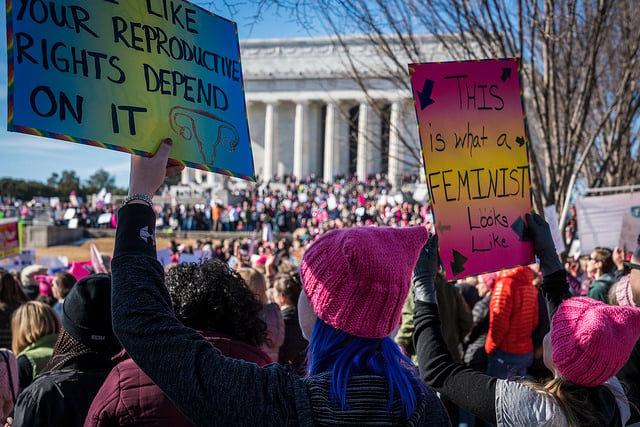I have been so proud of being involved in this intersectional third wave of feminism that I have three blue waves tattooed on my back with the words: Nevertheless, she persisted.
But the sad truth is that I’m listening to friends and acquaintances in the aftermath of the Women’s March, and we are failing women of color. I strongly suspect that if we are failing women of color, we are also likely failing the LGBTQ+ community.
Our efforts at intersectionality are falling short, and this failure is happening at a leadership level as well as on personal levels. Many women of color chose not to participate in this historic march because of a trend of silencing their voices in discussions along the way.
Women of color are not being represented adequately or fairly. They don’t feel that the marches are a safe space for their experiences. We have become more diverse and yet still haven’t grasped the concept that diversity is not inclusion. We need both.
This isn’t good enough. This is the third wave that’s supposed to be the tsunami that changes things for all of us. Not just for white women living in a white world, but for every person who has been oppressed.
Until we understand that race, gender identification, and sexual orientation are relevant to feminism, we cannot move forward. Women of color are saying that they’re pissed, and since many feminists are silencing their voices, I’m here as a white feminist to communicate: women of color are pissed. Did you hear that? Let’s say it louder for those in the back. Women of color are pissed! And they should be.
I just read that someone put a pink pussyhat on a statue of Harriet Tubman. I had to take a moment and just breathe through the ignorance. While I do believe many of our heroes may have stood with us at the march, putting a pink pussyhat on her head is beyond disrespectful.
First of all, and I cringe to have to explain what should be obvious, but Harriet Tubman wouldn’t have had pink genitalia. You know, as a black woman. Second of all, pussyhats were supposed to be sidelined this year so that trans women wouldn’t feel excluded. Perhaps some of us didn’t get the memo, but these pink pussyhats are not intersectional.
I do get it. I own one. I enjoyed all of the “pussy grabs back” sass that came out when Donald Trump made his disgusting boasts about touching women without their consent simply because he could get away with it. But I didn’t think about the full implications of the pink pussyhat until it was brought to my attention.
I just thought pink represented feminism—although don’t get me started on how good marketing is responsible for labeling pink for girls and blue for boys when it used to be the reverse. But when it was brought to my attention that it didn’t represent women of color or trans-women, I respected that. Why did I respect it? Because I shut up and listened to their experiences.
Someone out there is going to say this is all getting too politically correct, but I do believe that in a fight to eradicate oppression, we should not be oppressing others. And we are failing to be inclusive in our diversity. We’re failing women of color. We’re failing our LGBTQ+ community. We need to remember that they are essential to making this wave successful for all of us so it’s time that we do some work.
Here’s our homework:
Read up on intersectionality. What it is. Why it’s important. Learn how race, gender identification, and sexuality are also feminist issues.
Listen to the perspectives of women of color and the LGBTQ+ community. Hear them out without feeling fragile and defensive. Or feel fragile and defensive, but be quiet and listen anyway.
Don’t expect them to educate you. It’s not their job. We need to take the opportunity to research this and educate ourselves so that we can do better.
We need to call out our leadership and let them know that our efforts at intersectional feminism are failing egregiously. Here’s a link to the members of the National Team that organized the Women’s March on Washington. We also should contact our state organizers and make sure that inclusion is a priority for all events. While the National Team is diverse, state and local events may not be.
We need to speak up when we witness microaggressions and other attempts to silence their voices.
We need to make our events a safe space for all feminists to share their experiences without being told that their lives aren’t relevant to the struggle.
We need to shelve the pink pussyhats at our marches. We need to make sure our signs are as inclusive as we’re striving to be.
We need to have open discussions where we can admit that we don’t always know the right thing to do. So seek out feedback. And when someone brings a microaggression to our attention, we should address it. We can apologize for it and learn to adapt our perspective.
Our leadership needs to get with the program and advocate for inclusion, but we all need to do our part. It hurts my heart that on a day when women should have been empowering other women, many women felt silenced, excluded, and disempowered. From the bottom of my heart, I apologize to all of the women who felt that way by a movement whose members should have made you feel safe, supported, included, welcomed, and celebrated.
We hear you.
We see you.
Please don’t give up on us yet. Give us a chance to do our homework and do better. Because we can’t have equal rights for women if we’re leaving anyone behind.
~
~
~
Author: Crystal Jackson
Image: Flickr/Mobilus in Mobil
Editor: Travis May
Copy Editor: Callie Rushton









Read 0 comments and reply